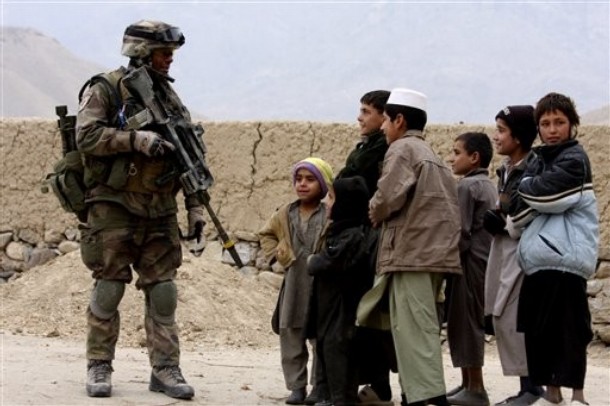Afghanistan’s Moment of Reckoning
New York Times
26 أغسطس 2014

Afghanistan faces ever deepening security and political crises. As American troops withdraw, Taliban military advances are threatening entire districts, and government coffers are dwindling.
NATO leaders are scheduled to hold a summit meeting next week that is supposed to reaffirm the alliance’s commitment to keep supporting Afghanistan’s security forces, which, like the rest of the government, are heavily dependent on international aid. It will be very hard to justify continued assistance if Afghan politicians are unable to form a government with a new president in Kabul.
Yet, Afghanistan’s rival presidential candidates, Ashraf Ghani and Abdullah Abdullah are putting the country’s stability at risk in refusing to agree on a winner two months after the disputed election to replace President Hamid Karzai. And the emboldened Taliban is taking advantage of the political chaos.
Although Mr. Karzai’s successor was supposed to have been sworn in on Monday, the country’s Independent Election Commission still has not completed a United Nations-supervised audit of 8.1 million disputed ballots. Mr. Abdullah won the first-round voting in April, but Mr. Ghani came out ahead in a preliminary count after the final round in June, prompting Mr. Abdullah to accuse Mr. Ghani and Mr. Karzai of colluding to rig the vote.
While Mr. Ghani and Mr. Karzai have denied the charges, few doubt there was substantial fraud. On Sunday, The Times’s Carlotta Gall reported that interviews with Afghan and international officials support some of Mr. Abdullah’s most serious claims, including ballot-box stuffing and a campaign by government officials to manipulate the outcome.
The Americans gave the candidates a way to ease the sting of defeat by brokering a deal that would have the rival camps create a national unity government. Under this plan, which both candidates accepted, the winner would become president and the loser, or his designee, would fill a new post of chief executive. But the powers and duties of that new job are also still in dispute.
The political climate has become so poisonous that a group of powerful government ministers and officials with strong ties to security forces have threatened to seize power in a sort of “soft coup” if the candidates cannot find a way to compromise, according to a report by Matthew Rosenberg in The Times last week. Advocates of this scheme say it may be the last chance to prevent violence and would be a stopgap measure to stabilize the country until democracy can be reinstated at some future point. But that is a fatuous argument, which has rarely proved to be true in other countries that underwent coups. Such a move would seriously undermine the Afghan Constitution.
A new, stable government is also important to the United States, which viewed a peaceful political transition as crucial to its plans to reduce its military presence to about 10,000 troops by the end of this year, and half that by the end of 2015, with an even smaller number after that. President Obama has repeatedly insisted that any post-2014 troop commitment was dependent on the new Afghan president signing a security agreement with the United States. However, Gen. Martin Dempsey, the chairman of the Joint Chiefs of Staff, amid concerns about potential violence among political factions, said on Monday that it may be possible for American forces to remain for a time even without the security agreement.
The best available solution is for Mr. Abdullah and Mr. Ghani to cooperate fully with the ballot audit, accept the results (which were never going to be fraud-free, given the immaturity of the democratic system) and quickly form a functioning government that reflects the country’s diversity. If they manage to do that, there might be some hope that they could, in time, restore voter trust and put Afghanistan on the path to a real democracy.
 عن أمل جنبلاط المتجدد: لبنان يستحق النضال
عن أمل جنبلاط المتجدد: لبنان يستحق النضال
 صحافيون أم عرّافون!
صحافيون أم عرّافون!
 ماذا يجري داخل أروقة بيت الكتائب المركزي؟
ماذا يجري داخل أروقة بيت الكتائب المركزي؟


 عن الخرائط التي تُرسم والإتفاقات التي تتساقط!
عن الخرائط التي تُرسم والإتفاقات التي تتساقط!
 “الإنحراف في الحياة”/ بقلم كمال جنبلاط
“الإنحراف في الحياة”/ بقلم كمال جنبلاط
 هاشتاغ #صار_الوقت يحل أولاً في حلقة جنبلاط
هاشتاغ #صار_الوقت يحل أولاً في حلقة جنبلاط
 طاولة نقاش عن أزمة الصحافة في جامعة AUST
طاولة نقاش عن أزمة الصحافة في جامعة AUST
 عبدالله: ليظهر لنا وزير مكافحة الفساد حرصه في صفقات البواخر والفيول
عبدالله: ليظهر لنا وزير مكافحة الفساد حرصه في صفقات البواخر والفيول
 عبدالله: غريب أمر وزارة مكافحة الفساد!
عبدالله: غريب أمر وزارة مكافحة الفساد!

 Comment to Uri Avnery: How Sad What Is Looming Ahead
Comment to Uri Avnery: How Sad What Is Looming Ahead
 “Not Enough!”
“Not Enough!”
 … لمن لم يقرأ يوسف البعيني/ بقلم وسام شيّا
… لمن لم يقرأ يوسف البعيني/ بقلم وسام شيّا
 كمال جنبلاط في مولده الأول بعد المائة: تعاليمه وأفكاره ما زالت الحلّ/بقلم عزيز المتني
كمال جنبلاط في مولده الأول بعد المائة: تعاليمه وأفكاره ما زالت الحلّ/بقلم عزيز المتني
 رئيس حزب/ وليس (… سابقاً)/ بقلم د. خليل احمد خليل
رئيس حزب/ وليس (… سابقاً)/ بقلم د. خليل احمد خليل
 التوازن السياسي في لبنان
التوازن السياسي في لبنان
 لبنان… مشاريع انقلابية مؤجلة
لبنان… مشاريع انقلابية مؤجلة
 جنبلاط وحَمَلة أختام الكاوتشوك
جنبلاط وحَمَلة أختام الكاوتشوك
 Le Liban est un symbole de tolérance
Le Liban est un symbole de tolérance
 Our Automated Future
Our Automated Future
 The True Origins of ISIS
The True Origins of ISIS
 Les Misérables vs. Macron
Les Misérables vs. Macron
 عذراً أيها المعلم/ بقلم مهج شعبان
عذراً أيها المعلم/ بقلم مهج شعبان
 رساله الى المعلم / بقلم ابو عاصم
رساله الى المعلم / بقلم ابو عاصم
 إلى روح القائد والمعلم كمال جنبلاط/ بقلم أنور الدبيسي
إلى روح القائد والمعلم كمال جنبلاط/ بقلم أنور الدبيسي
 أسرار وعناوين الصحف ليوم الجمعة 14 كانون الاول 2018
أسرار وعناوين الصحف ليوم الجمعة 14 كانون الاول 2018














